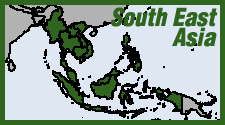 In another grim signal of a widening war in northern Burma's opium zones, last week saw an outbreak of intense fighting between government forces and ethnic rebels, prompting some 50,000 Kokang civilians to flee across the border to China. The clashes at the town of Laukkai (also rendered Laogai), Shan state, saw government air-strikes and helicopter strafing on villages controlled by the Kokang rebel group, the Myanmar National Democratic Alliance Army (MNDAA), and two allied militias. Some 50 government troops have been killed in the fighting, and soliders have recovered the bodies of several rebels. A line of refugees 10 kilometers long has reportedly piled up at the Chinese border crossing of Nansan. (AP, Feb. 14; Democratic Voice of Burma, Feb. 12; The Irrawady, Feb. 11)
In another grim signal of a widening war in northern Burma's opium zones, last week saw an outbreak of intense fighting between government forces and ethnic rebels, prompting some 50,000 Kokang civilians to flee across the border to China. The clashes at the town of Laukkai (also rendered Laogai), Shan state, saw government air-strikes and helicopter strafing on villages controlled by the Kokang rebel group, the Myanmar National Democratic Alliance Army (MNDAA), and two allied militias. Some 50 government troops have been killed in the fighting, and soliders have recovered the bodies of several rebels. A line of refugees 10 kilometers long has reportedly piled up at the Chinese border crossing of Nansan. (AP, Feb. 14; Democratic Voice of Burma, Feb. 12; The Irrawady, Feb. 11)
Chinese authorities are worried. Urging both sides to "exercise restraint," Beijing's Foreign Ministry said in a statement that more fighting "will have an impact on the stability of the China-Myanmar border areas and the security on the Chinese side of the border." According to Channel Asian News, Ministry official Hua Chunying said China respects the "territorial integrity" of Burma (formally called Myanmar, a name rejected by the democratic opposition), and vowed that Beijing "will not allow any organization or individual to carry out activities undermining China-Myanmar relations [from] within Chinese territory."
Beijing is generally close to the Burmese regime, but the new war on the Kokang could drive a wedge between them. Burmese authorities have called on Beijing to rein in any local officials who might be collaborating with the MNDAA and its warlord Phone Kya Shin (also rendered Peng Jiasheng). Ethnic loyalty is an inevitable factor here, as the Kokang are Han Chinese.
Like most of Burma's ethnic armies, the Kokang militias were at one time co-opted by the regime as a paramilitary force to fight other ethnic armies. In the early 1970s, the Kokang warlord Lo Hsing Han had his forces integrated as a "home guard" unit that collaborated with the Burmese national army. The terms were the usual ones. In a recent look back at the evolution of the Kokang armed movement, The Irrawady states: " In exchange for Lo Hsing Han's services to the nation, the Myanmar Army even helped protect his opium convoys from ambushes by rival gangs."
But the Kokang home guard unit, known as the Ka Kwe Ye, became too powerful from opium profits, and Burma's dictator Gen. Ne Win had the force officially abolished in 1973. But rather than surrendering his arms, Lo Hsing Han of course joined with his erstwhile enemies to fight the regime. The warlord was arrested later that year in northern Thailand and extradited back to Burma, where he was sentenced to death—not for opium-trafficking (which he had had unofficial license to do) but for "rebellion against the state." However, he was never executed—he was released from prison during a general amnesty in 1980, on a new pledge of collaboration with the regime. He returned to his old base in Shan state, where he set up a new paramilitary force under the Pyi Thu Sit ("people’s militia") program. He again grew wealthy (of course), and remained a pro-regime political boss in the area until his death last year.
But by then most of the Kokang fighters were with the rebel MNDAA, which remains in opposition and is allied with the major ethnic militias likewise now on the outs with the regime—the Shan State Army, Kachin Independence Army, Arakan Army and Ta'ang National Liberation Army.
It is obvious that the goad of Burma's seemingly endless war is control of opium—with the government repeatedly allowing ethnic armies to grow and traffick the stuff in exchange for pledges of loyalty; then using a crackdown on opium as a guise to crush them when they get too strong or independent. Now this pathological cycle shows potential to spread the war beyond Burma's borders and draw in the major regional power.
Cross-post to High Times







Recent comments
3 weeks 6 days ago
3 weeks 6 days ago
7 weeks 6 hours ago
7 weeks 6 days ago
11 weeks 6 days ago
15 weeks 5 days ago
19 weeks 5 days ago
20 weeks 3 days ago
30 weeks 3 days ago
34 weeks 4 days ago